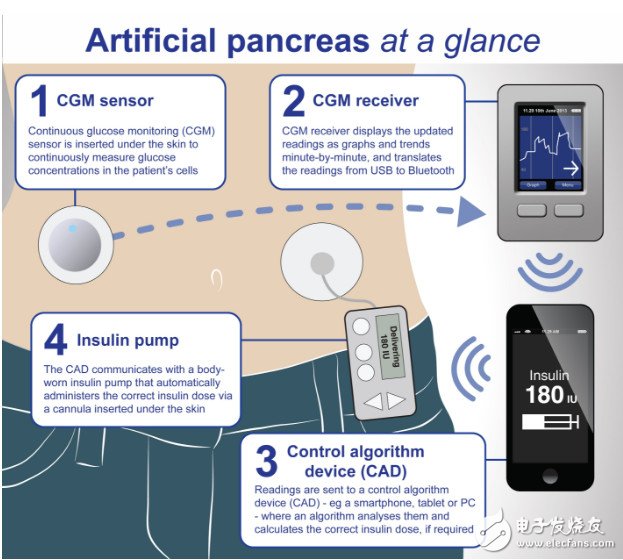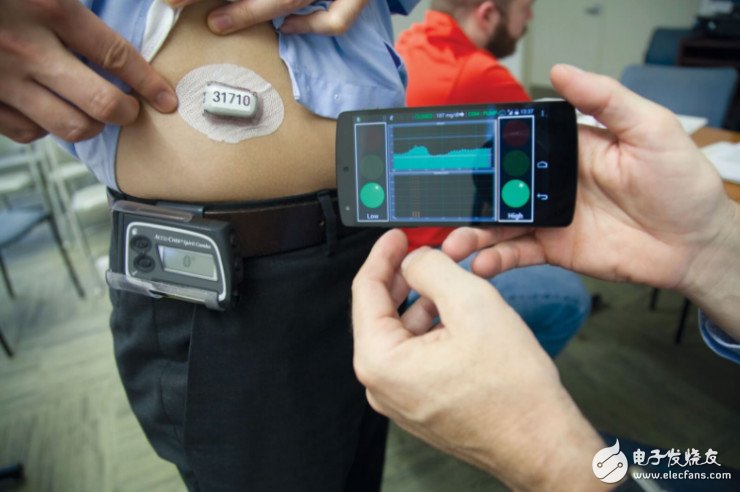In the medical technology industry, 2016 is a boom year, and VR, AR, and wearable device data analysis are rapidly developing. These dazzling technologies are taking turns in our daily life and consumer markets. In 2017, this The momentum will continue as always.
The role of the dreamer is not to make bold predictions about the future. What is important is that this "betting" has no meaning for human development. The dreamer's job is to analyze trends that may reveal the future and try to build bridges between the present and the future. Despite this, Volkswagen still hopes that we will make some predictions about the future of medical technology. Below are 13 medical technologies that are most likely to fire in 2017.
A new era of diabetes careIn 2016, the US FDA approved the world's first artificial pancreas, which monitors blood sugar and automatically injects insulin.
Traditional diabetic patients need regular fingertip blood tests and insulin injections. This device frees the patient, making it easier not only to control blood sugar more precisely, for example at night. The specific process of artificial pancreas work is:
Blood glucose monitoring: The blood glucose monitoring sensor is implanted under the skin, reading the blood glucose value every 5 minutes, and sending the data to the blood glucose monitoring receiver.
Insulin pump: usually worn at the waist, can automatically inject insulin.
Computer algorithms: usually smartphone size, wireless connection to the blood glucose detector and insulin pump, if needed, can accurately calculate the amount of insulin required for injection based on the blood glucose value obtained.

This artificial pancreas sometimes requires manual intervention, such as when the patient needs to determine the amount of insulin to be injected before meals. But overall, it mimics the function of a healthy pancreas, allowing diabetics to manage blood sugar in a more sustainable and easier way. It is the most meaningful step in diabetes management for many years.
However, the development of diabetes care does not stop there.
According to Lei Feng.com, Google has a digital contact lens patent that measures blood sugar levels through tears. This is a smart contact lens with non-invasive sensors and other electronic chips that measure the blood sugar level to the smartphone. Google has established a partnership with pharmaceutical company NovarTIs. Although no further reports have been heard, it is rumored that they will conduct clinical trials in 2017.

Digital technology has changed the way cancer is treated in the market. Many startups have joined the industry, such as FoundaTIon Medicine, SmartPaTIents, etc., and personalized treatment for cancer treatment is increasingly promising.
FoundaTIon Medicine is dedicated to the application of oncology genetics to the treatment of cancer, based on patient genetic testing results, to provide personalized cancer treatment. The company's services include: third-generation gene sequencing, the world's largest tumor molecular database, personalized medication.
SmartPatients, build an online community, patients and medical staff learn from each other, help patients connect new drug clinical trials, cancer patients encourage each other.
The development of tumor immunotherapy has opened up a new phase in cancer treatment. Liquid biopsy refers to the capture of tumor cells or DNA that has fallen off into the bloodstream of the tumor tissue. Instead of extracting from the tumor tissue, surgical biopsy and biopsy are omitted for some patients, and these two biopsies require long-term guidance to guide patients to cancer treatment. of. Liquid biopsy technology is a major event in 2016, and today it is used on more and more patients worldwide. Although the technology has limitations, it is becoming more and more perfect.
In short, precision medicine is changing the old model of treating cancer: we started using sniper rifles instead of cannons.
Artificial intelligence in American clinicsIBM's advanced artificial intelligence programs are transforming healthcare into a quantifiable service: all of our information will be used in healthcare. To date, it has been used in oncology and radiology (medical screening projects). This Watson genomics project, which combines cognitive computing with genomic tumor sequencing, has greatly advanced the development of precision medicine. Take the Watson oncology expert system at the MD Anderson Center as an example. What it can do is:
Summary of patient information updated in real time: Interpret structured and unstructured clinical data to create dynamic patient case summaries.
Evidence-based treatment options: Advice on treatment and care based on patient profiles, consensus guidelines, relevant literature, and MD Anderson expertise.
Recommendations for Nursing Pathways: Provide advice on ways to care, warn clinicians about possible adverse reactions or initiate active care measures to improve patient management.
Although Watson does not conduct medical consultations, based on patient data, it can present the most relevant and most likely medical diagnosis, and the doctor will make the final diagnosis. The point is that computer assistants can only assist doctors in their work, and it will never replace them.
Driverless cars will be equipped with health sensorsThere will be more and more cars with autonomous driving functions in 2017. In September of this year, Uber used self-driving car passengers in the state of Pittsburgh. And the company and Volvo have reached a cooperation, want to complete their ambitious goal as soon as possible - replace more than 1 million drivers with robots as soon as possible. It is said that it has achieved good results: Volvo trucks without drivers have traveled all over Europe!
While working to introduce driverless cars, the company is also equipped with a large number of sensors in the car. In 2017, we had free time on these vehicles, for which Uber, Volvo and Tesla will install health sensors in the driver's seat. I believe that in the future, the car itself will be part of health care.
New services in nutritional genomicsIn 2014, the US FDA banned the marketing of 23andMe, the largest genetic testing provider, saying that it provides medical consulting services that require approval before proceeding. Despite the precedent of 23andMe, several companies continue to promote genetic testing, interpretation and analysis services without the pre-market approval of the FDA. Although the FDA can't stop companies from providing gene-related services to patients forever, the next big thing, nutrition genomics, is already knocking. It will become a superstar in 2017.
According to Lei Feng.com, nutrition genomics is a new, cross-disciplinary science that combines genetics and nutrition. The basic idea of ​​nutritional genomics is that we have information about what our organism needs in our genome. We should find these data and make good use of them so that we can live a long and healthy life.
The implementation process is like this: Sequencing your DNA, then the smart app tells you what food you should eat and what to eat. In California, there is already a startup that focuses on nutritional genomics. Another innovative company, Habit, plans to identify the ideal meal for each customer through genetic markers and send the meal directly to their doorstep.
Used on systems above 1000 volts, protect equipment from lightning and switching surges.
Lightning Arrester,Distribution Pole,Composite Lightning Arrester,Lightning Rod
Jilin Nengxing Electrical Equipment Co. Ltd. , https://www.nengxingelectric.com